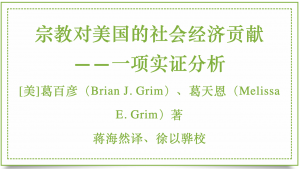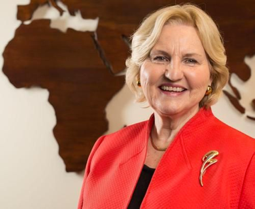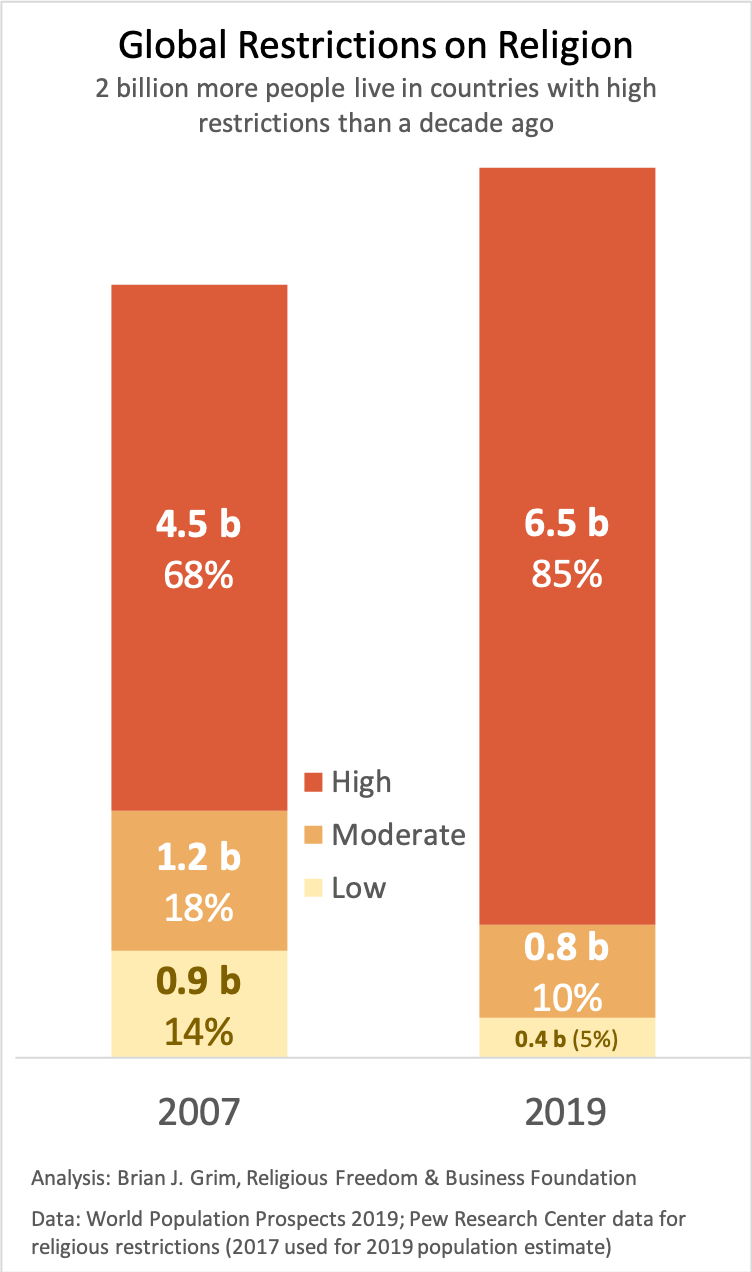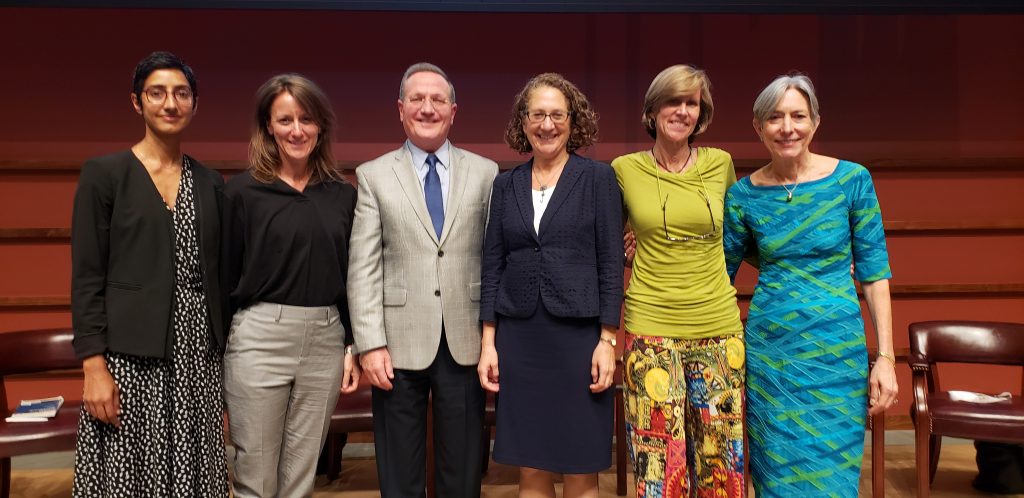
In addition to the trade war with the U.S., China’s ongoing crackdown on religion adds another weight dragging down what has been remarkable economic growth spurred on by the religious openness following the Cultural Revolution of the 1960s-1970s.
RFBF President Brian Grim will discuss the past and current situation of religion, politics, economics and culture in the People’s Republic of China at the Rimini Meeting, Italy.
Read (in Italian) a news report on Grim’s talk:
Grim’s discussion will be held in the “Paths Arena” at the annual Rimini Meeting and introduced by Luca Fiore, journalist for Traces Magazine. Join us on Tuesday, August 20th at 17:00.
The Rimini Meeting is a joyous annual gathering attracting nearly one million people including top political personalities, business leaders, representatives of different religions and cultures, intellectuals and artists, entertainers, athletes, and movers and shakers from across the globe. The theme of Rimini 2019 (Aug. 18-24) is Your name was born from what you gazed upon. See all of Grim’s events at Rimini through the years.
Chinese Secret to Sustainable Economic Growth: Under Threat?
Freedom of religion can contribute to a rich pluralism that is itself associated with economic growth. For instance, the world’s 12 most religiously diverse countries each outpaced the world’s economic growth between 2008 and 2012. Indeed, the active participation of religious minorities in society often boosts economic innovation, as the history of the Industrial Revolution has shown.
In China, during the Cultural Revolution of the 1960s and 70s, religion was outlawed and many people were persecuted for their beliefs. In the 1980s – 2000s there was an openness that resulted in the spread of religion, such that China is now home to the world’s second-largest religious population after India, according to demographic estimates.
A recent study in the China Economic Review finds a link between Christianity, adhered to by some 5% of China’s population, and the nation’s economic growth.
Arguably, ensuring freedom for religious groups in China and elsewhere is a way to stimulate and sustain growth in the decades ahead. It’s something every country can benefit from.
The Economic Strength of China
The story of China’s economic growth is not primarily one of competition with the U.S. The story is more complex. Peston (2014) argues that “the most important number in the world, for the past 30 years and next five years, is China’s growth rate.” Following 30 years of rapid growth at 10 percent annually, China’s growth slowed to 7 percent as the global economy went through the 2008 downturn and is now slowing even more. China’s slowdown has adverse implications for all. Living standards in the West have been shored up because China made the things people buy cheaper and cheaper. According to Peston, “We should be under no illusion that the really big thing in the world which will have an impact on our living standards is what happens in China. Nothing else really matters in comparison.”
What’s beneath China’s remarkable economic growth, which has not only given fuel to global growth but also lifted more than 500 million people out of abject poverty?
In part it is due to Deng Xiaoping opening China to market mechanisms, modern technology, and management from the West. And certainly, Chinese government policies moving the country from international isolation to integration have played a significant role. But according to Zhao (2013, 2014), an expert in Chinese business and strategic development at Siemens Corporation, these explanations are insufficient given the potential drags on the economy from government inefficiency and corruption, which President Xi Jinping is struggling to contain (Li and McElveen 2014).
China’s Religion Factor
 Zhao argues that Western learning and pro-growth government policies have set loose the real creators of China’s economic success—its people and the largely Confucian culture that makes them “ambitious, hardworking, thrifty, caring for their families, and relentlessly pursuing good education and success” (2014).
Zhao argues that Western learning and pro-growth government policies have set loose the real creators of China’s economic success—its people and the largely Confucian culture that makes them “ambitious, hardworking, thrifty, caring for their families, and relentlessly pursuing good education and success” (2014).
Moreover, it is important to get past the notion that China is an unreligious country (see table). On the one hand, it has more religiously unaffiliated people than any other country, and it is led by a party officially committed to atheism. But on the other hand, China is now home to the world’s second largest religious population after India, according to the latest demographic estimates (Pew Research Center 2012).
Specifically, China is home to the world’s largest Buddhist population, largest folk religionist population, largest Taoist population, 7th largest Christian population, and 17th largest Muslim population (ranking between Yemen and Saudi Arabia in size) making China one of the world’s most religiously diverse nations—something which is also associated with economic growth (Grim 2014a). But the projected growth of Christianity is of particular note. A study by Purdue University’s Yang, cited recently in the Economist (2014), finds that China’s Christian population may become the world’s largest by 2030.
The growth of Christianity and the growth of China’s economy may be related, according to a new study in the China Economic Review (Wang and Lin 2014). In the study, Qunyong Wang from the Institute of Statistics and Econometrics, Nankai University, Tianjin, and Xinyu Lin from Renmin University of China, Beijing, find that Christianity boosts China’s economic growth. Specifically, they find that robust growth occurs in areas of China where Christian congregations and institutions are prevalent.
Using provincial data from 2001 to 2011 in China, Wang and Lin investigated the effect of religious beliefs on economic growth. Among the different religions analyzed, they found that Christianity has the most significant effect on economic growth.
The first among several reasons Wang and Lin site for this effect is that government-recognized Christian congregations and institutions account for 16.75 percent of all religious institutions, and such institutions are tied to economic benefit (see next paragraph). The share of Chinese institutions that are Christian is far higher than the share of the Chinese population made up of Christians affiliated with government-approved churches, which is only about 3 percent. In addition, tens of millions of Chinese belong to unregistered Protestant and Catholic Churches, and many of these also have congregational properties, clinics, and even educational institutions.
Such institutions tend to stimulate economic growth for individuals and communities. Consider, for example, a study (Cohen and Jaeger 2011) in Philadelphia led in part by Prof. Cnann (2014) of the University of Pennsylvania. They found that the 12 congregations examined contributed $52 million in annual economic value to the city of Philadelphia, for an average of $4.3 million per congregation. These benefits not only include direct spending for goods, services, and salaries, but also the safety net and networks provided to individuals, the magnet effect of attracting everything from lectures to weddings, and valuable public spaces that provide communities with centers of cultural, ethical, spiritual, and even recreational value.
Further, Grim and Grim (2016) found that religion contributes nearly $1.2 trillion to the U.S. national economy each year (see  Chinese translation of this research). Such benefits likely occur in China as well, as congregational behavior is broadly similar.
Chinese translation of this research). Such benefits likely occur in China as well, as congregational behavior is broadly similar.
Furthermore, Wang and Lin argue that Chinese Christianity’s social doctrines may also have economic impact. They suggest that Christian ethics emphasize the overall development of human beings, not just economic development. For instance, they observe that the Christian obligation to be accountable to God and their fellow believers tends to result in legal and rational investment behavior rather than illicit or wild speculation.
It may be that the impact of Christianity identified by Wang and Lin is similar to the impact of Confucianism identified by Zhao. In a public dialogue at Peking University (Beijing Forum 2010), world-renowned Confucian scholar, Prof. Tu Weimin of Harvard, and Christian theologian Jürgen Moltmann of the University of Tübingen, found commonalities between Confucianism and Christianity. For instance, Confucius’s famous quote, “Do not do to others what you don’t want to be done to you,” is almost a perfect mirror image of Jesus’s golden rule, “Do to others whatever you would have them do to you.”
Wang and Lin found some positive, though inconsistent economic effects from China’s other major faiths, including folk religion, Buddhism, Islam, and Taoism. (Confucianism was not included in their study, and is not counted as an official religion by the government.) They conclude that the implication is not for the country to favor one faith above another, but to “build a better-informed economics, and in the long run, better policy” (Wang and Lin 2014, 286).
As China continues to impose extreme restrictions on religion and religious groups, the prospects for its continued economic decline grow.



 Rev. Dr. Jo Anne Lyon was the General Superintendent of The Wesleyan Church. She was also a member of the World Economic Forum’s Global Agenda Council on the Role of Religion.
Rev. Dr. Jo Anne Lyon was the General Superintendent of The Wesleyan Church. She was also a member of the World Economic Forum’s Global Agenda Council on the Role of Religion. Antje Jackelén, Archbishop of Sweden, together with Prof. Linda Woodhead (UK) and Brian Grim (US) – and input from the Global Agenda Council on the Role of Religion – looks at how faith interacts with each of the
Antje Jackelén, Archbishop of Sweden, together with Prof. Linda Woodhead (UK) and Brian Grim (US) – and input from the Global Agenda Council on the Role of Religion – looks at how faith interacts with each of the 







